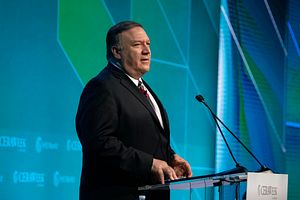China has pushed back on a speech made earlier this week by U.S. Secretary of State Mike Pompeo on the country’s international practices, including its behavior in the South China Sea and use of debt as a tool of statecraft.
“By blocking development in the South China Sea through coercive means, China prevents ASEAN members from accessing more than $2.5 trillion in recoverable energy reserves,” the U.S. secretary of state said, speaking in Houston, Texas, on Tuesday.
“To contrast, the United States Government promotes energy security for those Southeast Asian nations. We want countries in the region to have access to their own energy,” Pompeo added.
“We want to help them. We want to create partnerships. We want transparent transactions, not debt traps. We explore responsibly.”
“China doesn’t play by that same set of rules. Its values are simply different,” Pompeo underscored.
In the South China Sea, China, along with Vietnam, the Philippines, Malaysia, Brunei, and Taiwan, has competing claims. Beijing has clashed with Vietnam in particular over hydrocarbon exploration rights in disputed waters.
The Chinese Ministry of Foreign Affairs hit back at Pompeo’s remarks, describing them as “irresponsible.” Lu Kang, a spokesperson for the Chinese Ministry of Foreign Affairs, said that “Nations in the region are capable of resolving and managing the disputes in their own ways.”
Echoing longstanding warnings from China for the United States to stay out of regional disputes, including in the South China Sea, Lu said that “Nations outside the region should refrain from stirring up trouble and disrupting the harmonious situation.”
Building on months of U.S. criticism of China’s overseas financing practices, Pompeo also took aim at what the U.S. has called “debt trap” diplomacy.
“[China is] using the debt trap … to put these countries in a place where it isn’t a commercial transaction. It’s a political transaction designed to bring harm and political influence in the country in which they’re operating,” Pompeo added, calling on the audience of primarily oil industry leaders to work with the U.S. government to push back on these practices.
“We need to roll up our sleeves and compete by facilitating investments all across the world and encouraging partners to buy from us, and by punishing the bad actors,” Pompeo noted.
The Trump administration has identified China as a great power competitor of the United States and has pursued a “free and open” Indo-Pacific strategy to push back on what it sees as growing Chinese influence in the region.

































